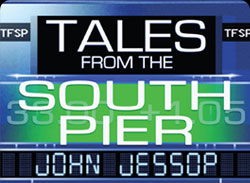The organisation that manages advertising in British cinemas on behalf of film distributors has banned a 60-second advertisement by the Church of England featuring the Lord’s Prayer. The excuse offered, wrapped in a policy directive barring any and all religious or political advertising in such places of entertainment, is that some members of the audience might find it offensive. Presumably this was aimed primarily at Muslims, although no denomination was mentioned by name.
Anyway, that objection falls flat because other religions would be free to enjoy the same facility. A bit of healthy competition, in this field as in all others, could only be good for consumers. For that reason, I think the policy is misguided.
Lord knows, the dear old CofE, facing ever-falling church attendance, could use all the help it can get in persuading its errant flock to return to the fold. That holds just as true, I am certain, for the Roman Catholic Church, not to mention several hundred of Protestant denominations.
The ban also deprives the advertising industry of a much-needed new source of income. Come to think of it, there is no precedent of religious commercials on television, unless one includes the evangelical programmes that populate the so-called ‘religion’ channels. Television could hardly be ignored if the advertising thing caught on, although some faith groups, lacking the funds committed by oil companies and purveyors of fast food, might find the rates prohibitively high.
I am not sure, though, that a recital of the Lord’s Prayer, in the present case sung by a gospel choir, is the way forward. A harder sell might be needed. And the CofE has a lot going for it in that respect.
It is not only a British invention, it carries the royal warrant: after all, the queen herself is the head of the institution, as all monarchs have been since Henry VIII. With this kind of sponsorship, advertising copy-writers would have plenty of scope for exercising their creative talents.
“The Cof E – the very best of religions.
It has an impeccable pedigree. It’s the religion of royalty.
And if that’s not enough, it’s tailored for your convenience. No compulsory attendance. No signing-on fees. It’s free to all, for all time.
What’s more, it’s thoroughly British. British-made, British-owned and British managed.
CALL your local vicar NOW for a FREE demonstration. Atheists welcome.”
Naturally, the CofE has taken strong exception to the ban. It is even threatening to sue the agency responsible, the Digital Cinema Media, which runs adverts for the Odeon, Vue and Cineworld chains. In a letter to the DCM, the CofE’s chief counsel, alleges that the decision would involve unlawful discrimination because DCM would be “directly discriminating against the Archbishop’s Council” by failing to provide a service to them on grounds of religion or belief.
I am not sure precisely what role the archbishops themselves played in approving the proposed advertisement. Some sub-committee responsible for advertising and promotion, I suppose. Sadly, though, it is now out of their hands and in those of the legal department.
The Reverend Arun Arora, the CofE’s director of communications, adds: “If they want to be consistent on not carrying any ads that have any connection with religious belief, I’d like them to cancel all ads linked to Christmas as a Christian festival”.
He has a point there, on the face of it, although one might ask since when did Christmas became a religious festival. Its origins and symbols and ceremonies are of pagan origin, its recent manifestations almost entirely commercial. I would warrant that ninety percent of the population celebrates Christmas for reasons other than faith, while only five percent do so by going to church, or even thinking about the birth of Christianity’s founder. Before you start to question those figures, I admit to making them up, but the order of magnitude is probably about right.
But I shall leave it at that, as legally speaking I may be skating on thin ice.
We must wait and see how this row gets resolved. The best approach, I think, would be for the leaders of the CofE to convene some kind of ecumenical conference, to include all religions, aimed at presenting the theatre owners with the full power and glory of inter-faith solidarity. That would be something to behold.
Sadly, it is unlikely to happen, even if the Muslim Council of Britain professes to be ‘flabbergasted that anyone would find this prayer offensive to anybody”.
Speaking of the founder of the Christian faith, I wonder what he, or rather He, would make of it all. Did he/He enjoy all the benefits of an advertising agency and legal advisors?
“The Greatest Story Ever Told – brought to you by ….”
Metro-Goldwyn-Mayer, as I recall. But was MGM around back then?


Be First to Comment